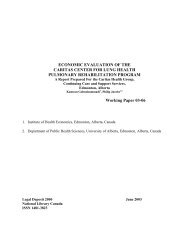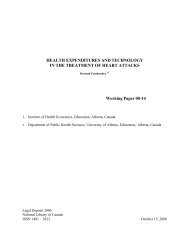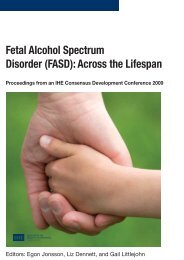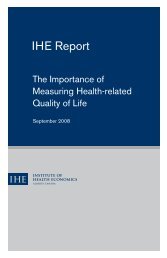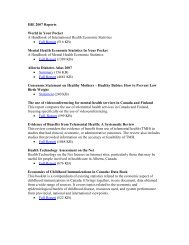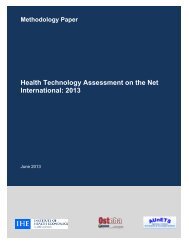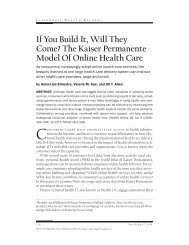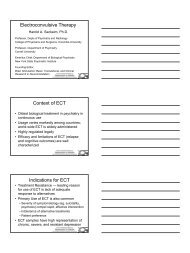Bariatric treatments for adult obesity - Institute of Health Economics
Bariatric treatments for adult obesity - Institute of Health Economics
Bariatric treatments for adult obesity - Institute of Health Economics
- No tags were found...
Create successful ePaper yourself
Turn your PDF publications into a flip-book with our unique Google optimized e-Paper software.
the need <strong>for</strong> regular physical activity, and how to better regulate the lifestyle habits that need to bemodified. According to best practice recommendations, an effective weight management programrequires a specially adapted treatment structure <strong>of</strong>fering:a range <strong>of</strong> bariatric <strong>treatments</strong> targeted at the various subgroups <strong>of</strong> the population;the availability <strong>of</strong> a multidisciplinary team; a specialized technical and equipment capacity.Long-term, if not lifelong, follow-up and continued supervision and support are necessary toprevent weight regain, monitor disease risks, and treat co-morbidities. Implementation <strong>of</strong> effectiveweight management programs should also include a continuous improvement approach integratingongoing audit and evaluation.To improve adherence to bariatric <strong>treatments</strong> and to enhance the success <strong>of</strong> long-term weightmanagement, patient-, provider-, and system-level barriers to effective weight control should beidentified and addressed. Patients’ readiness and motivation to make the necessary lifestyle changesare critical. Pr<strong>of</strong>essional support and involvement are also necessary <strong>for</strong> sustained lifestyle andbehavioural changes to take place. An environment free <strong>of</strong> bias toward <strong>obesity</strong> is an importantrequirement in providing quality <strong>of</strong> care <strong>for</strong> individuals with <strong>obesity</strong>. The quality <strong>of</strong> bariatric carealso depends on healthcare pr<strong>of</strong>essionals receiving appropriate training and accreditation and havingan awareness <strong>of</strong> available local resources. Although long-term multidisciplinary care and follow-upunderlies the best practice, it may present certain barriers to the implementation <strong>of</strong> evidence-basedweight management programs because <strong>of</strong> the lack <strong>of</strong> resources to support such programs within thecurrent environment <strong>of</strong> cost containment, and the lack <strong>of</strong> widespread insurance coverage <strong>for</strong> weightmanagement.The disease management and chronic care models may provide helpful templates <strong>for</strong> redesigningclinical practice in <strong>adult</strong> <strong>obesity</strong> management and <strong>for</strong> helping to overcome some <strong>of</strong> the barriers toeffective weight management. According to the reviewed literature, the most effective weightmanagement programs adopted a comprehensive disease management/chronic care approach thatcombines health promotion at the population level with clinical interventions and support. Thedevelopment <strong>of</strong> a multi-level <strong>obesity</strong> management network <strong>of</strong> mutually collaborating facilitiesinvolving primary care physicians, specialists in bariatric care, other specialists, and support groups isencouraged as a sensible response to the current demand <strong>for</strong> action.<strong>Bariatric</strong> <strong>treatments</strong> <strong>for</strong> <strong>adult</strong> <strong>obesity</strong> 40



